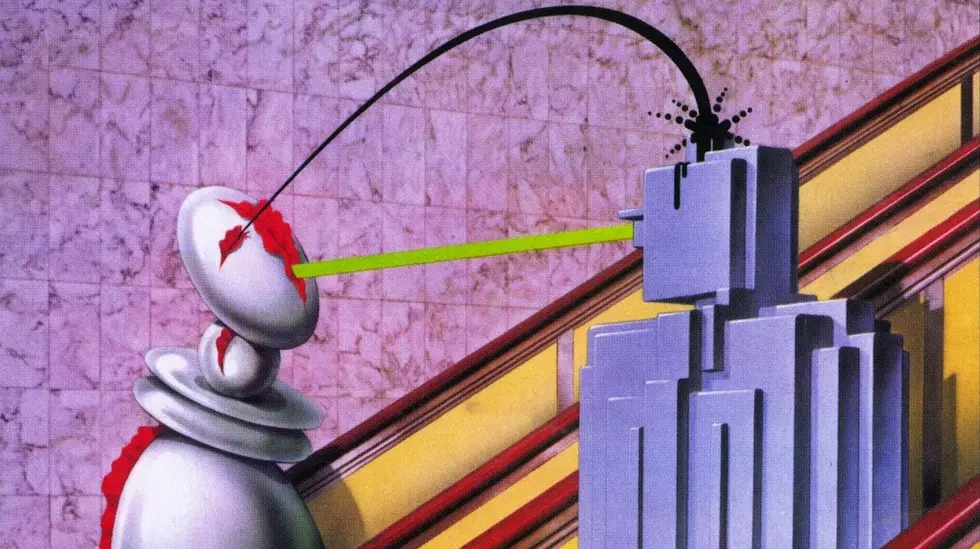
How Black Sabbath Tried but Failed to Achieve ‘Technical Ecstasy’
Sometimes in music the difference between love or hate, triumph or fiasco can be as stark as black and white. Just ask the members of Black Sabbath, whose seminal '70s discography is generally demarcated by what came before and after their seventh studio album, Technical Ecstasy, which was released on Sept. 25, 1976.
With its blindingly bright, futuristic artwork, created by top '70s album cover design shop, Hipgnosis (but famously dismissed by Ozzy Osbourne as "two robots screwing" in author Mick Wall's Sabbath biography Symptom of the Universe), Technical Ecstasy emerged out of a particularly convoluted period in the band's history – one mired in serious business and personal issues, and affected by outside forces beyond their control.
Chief among these, perhaps, was the arrival of punk rock in 1976, which literally turned the music world upside down, ushering in a new generation of brash young bands and transforming older idols into pariahs. For Sabbath, which had dealt with rejection and disrespect even among their peer group precisely for being working class rubes, getting pegged as pompous dinosaurs alongside Pink Floyd and Led Zeppelin added insult added to injury.
As Wall explained in his book, "Tony Iommi's response to all this was to simply bury himself ever deeper into the recording process. Oblivious to the new direction the rest of the rock world was now heading in, Iommi began to conceive of a new, even more grandiose Sabbath sound."
In other words, Technical Ecstasy was a philosophical successor to 1973's Sabbath Bloody Sabbath – i.e. a concerted attempt to gain critical respect with a more polished and adventurous sound – even though the band had, ironically, only just backtracked into raw sounds with 1975's Sabotage).
In any case, the other three members of Sabbath had little to contribute, having grown so accustomed to relying on Iommi to both lead them and save the day that they barely participated in the creative process anymore. Explained Iommi in Wall's book, "If I'd walk into the rehearsal room and couldn't think of anything, we'd end up probably not doing anything [that day]. I just felt that they sort of looked at me like, 'Oh well, he'll come up with something' and it did become a strain in the end."
Listen to Black Sabbath's 'Back Street Kids'
Geezer Butler admitted this as well in Wall's book, saying, "Tony's the one who's always kept everybody together musically, he always believed in it and he was the one who always used to give everybody a kick up the arse when we'd get despondent." But as Osborne pointed out in the same book, there was no overcoming the band's prodigious drug consumption by then. "We'd have coke dealers over," he said, "we'd have stuff on the drip, you know? Cocaine had got a hold of us bad."
This perfect storm obviously had a negative effect on Technical Ecstasy's songs, which ranged from soulless, synthesizer-drenched victims of technology ("You Won't Change Me," "Gypsy"), not-quite-right progressive experiments ("All Moving Parts (Stand Still)"), sappy ballads ("She's Gone," the Bill Ward-sung "It's Alright"), and pale imitations of head-bangers past ("Back Street Kids," "Rock 'n' Roll Doctor"). Indeed, the only song to display some lasting power as a regular presence in Black Sabbath's live sets, was the album's last, "Dirty Women," which revived some of their melancholy doom amid memorable riffs to overcome the surrounding production enhancements.
None of which did much good when consumers gave their verdict that September. Technical Ecstasy stalled at No. 51 on the U.S. chart (Sabotage had been seen as a bad performer at No. 28, earlier albums had gone hovered around the Top 10) and many fans probably didn't even recognize this unfamiliar-looking product as a Black Sabbath album. Not helping matters, a double-vinyl greatest hits set called We Sold Our Soul for Rock'n'Roll (authorized not by the band, but their former manager) had been clogging record store shelves in recent months, perhaps helping to impart a perception that Black Sabbath's most important music was behind them.
There were obviously numerous mitigating factors behind Technical Ecstasy's negative attributes and reputation, but history typically has no time or patience for nuance. In the long run, for most observers not privy to all that was going down behind the scenes, the album's failings were all as simple as black ... and white.
Top 50 Classic Heavy Metal Albums
You Think You Know Black Sabbath?
More From The Basin's Classic Rock










